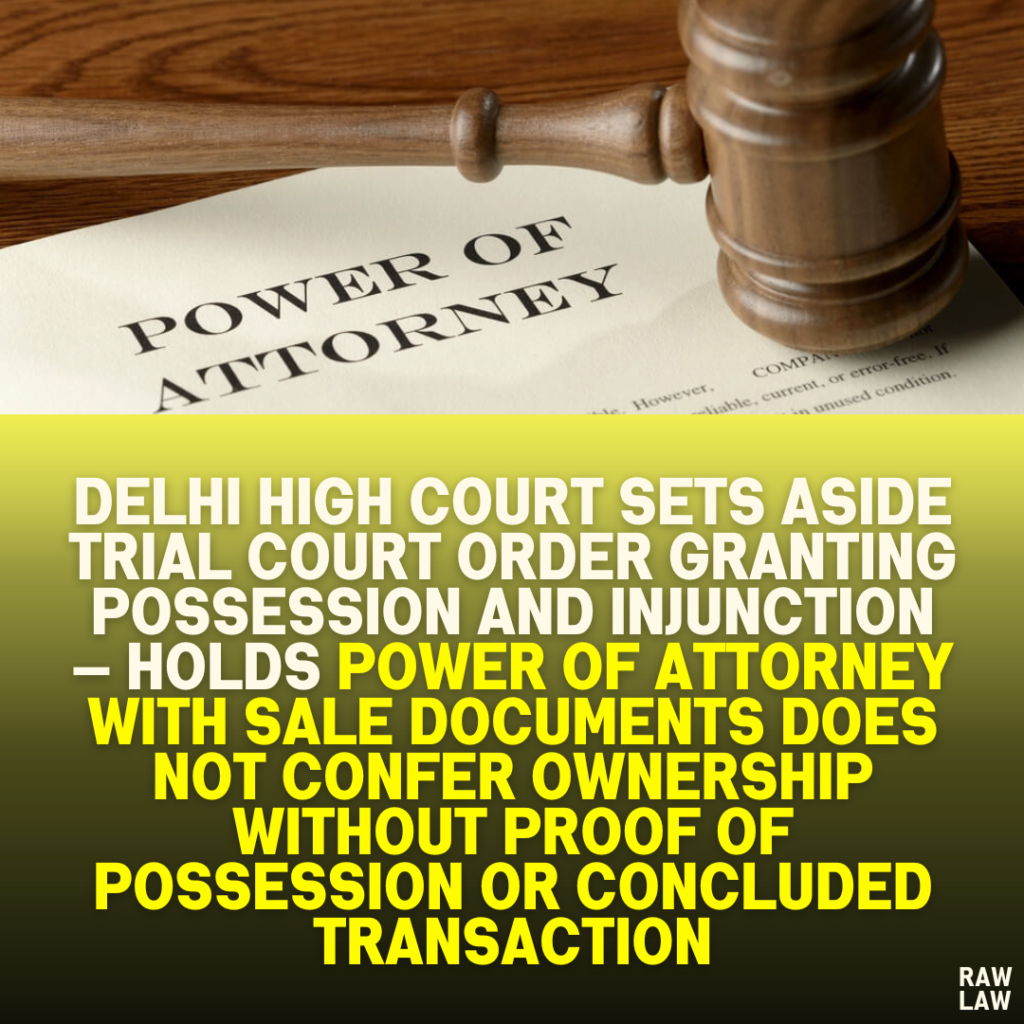Court’s Decision
The Delhi High Court allowed the appeal, setting aside the Trial Court’s judgment that had granted possession, damages/mesne profits, declaration, and permanent injunction to the respondent. The Court held that the respondent failed to prove actual possession or a concluded transaction, and thus was not entitled to any of the reliefs sought.
“The finding of the Ld. Trial Court, qua the grant of relief of possession purely on the basis of the documents without in any manner being able to prove possession… is unsustainable.”
Facts
The dispute revolved around a 50-square yard property in Budh Vihar, Delhi. On 10.01.2000, Appellant No. 2 executed documents (GPA, agreement to sell, receipt, will, affidavit, possession letter) in favour of the respondent for ₹30,000. Later, on 26.09.2001, Appellant No. 2 revoked these documents and executed fresh sale documents in favour of her brother, Appellant No. 1, for ₹35,000.
An FIR was registered based on the respondent’s complaint. Subsequently, a suit was filed seeking possession, declaration, mesne profits, and permanent injunction. The Trial Court initially dismissed the suit, but it was remanded by the High Court, after which the Trial Court granted reliefs in favour of the respondent.
Issues
- Whether the respondent was entitled to possession and mesne profits based on the documents executed on 10.01.2000.
- Whether the respondent could seek a declaration nullifying the subsequent documents executed in favour of Appellant No. 1.
- Whether the respondent was entitled to permanent injunction.
- Whether the suit was maintainable without establishing title and possession.
Petitioner’s Arguments (Appellants)
- The sale was never effectuated as the respondent did not pay the sale consideration.
- Possession was never handed over to the respondent.
- The sale documents were validly revoked.
- Section 54 of the Transfer of Property Act requires a registered sale deed, which was not executed.
- The respondent failed to prove possession and had no right to seek recovery or injunction.
Respondent’s Arguments
- The sale consideration of ₹30,000 was paid and acknowledged in a signed receipt.
- Possession was handed over via a possession letter dated 10.01.2000.
- The revocation deeds did not mention non-payment as a reason.
- The family of Appellant No. 2 was allowed to re-enter the property temporarily out of goodwill.
Analysis of the Law
- The Court emphasized that actual possession must be proven to seek recovery. A mere possession letter was not sufficient.
- Section 54 of the Transfer of Property Act was cited, affirming that the transaction was incomplete without a registered sale deed.
- The Court noted that a Power of Attorney coupled with sale documents cannot confer ownership rights without proof of possession or concluded transaction.
- The revocation deeds dated 26.09.2001 were registered and not challenged or cancelled by the respondent.
Precedent Analysis
The Court referred to the following judgments:
- Smriti Debbarma v. Prabha Ranjan Debbarma (2023 SCC OnLine SC 9): A plaintiff must prove legal title and actual possession; possession is protected unless someone with better title seeks to dispossess.
- Anathula Sudhakar v. P. Buchi Reddy (2008) 4 SCC 594): Where title is disputed, mere possession or GPA/SA/Will cannot confer ownership; proper declaratory relief must be sought.
- Union of India v. Vasavi Coop. Housing Society (2014) 2 SCC 269): Weakness in the defendant’s case cannot strengthen the plaintiff’s claim unless title and possession are proven.
- Nagar Palika v. Jagat Singh (1995) 3 SCC 426): In suits for declaration of title, the onus to prove title lies on the plaintiff.
Court’s Reasoning
- The respondent failed to prove possession of the suit property despite relying on sale documents.
- The family of Appellant No. 2 continued to reside in the property for over two years after the alleged sale.
- The respondent did not produce independent evidence or witness testimony (notably, the husband of Appellant No. 2 was not examined) to support the claim of possession.
- The Court highlighted contradictions between the affidavit and cross-examination of the respondent regarding possession.
“There is nothing that has been brought on record to show actual possession or even assertion of any rights as the lawful owner in terms of receiving any rent…”
Conclusion
The Court held:
- The respondent had not proved either the sale or the possession.
- Relief of possession, declaration, mesne profits, and permanent injunction were not sustainable.
- The Trial Court’s judgment granting these reliefs was set aside.
Implications
- The judgment reaffirms that documents like GPA/Will/Agreement to Sell do not create title or possession rights unless backed by a registered sale deed and proof of possession.
- Plaintiffs must seek declaratory reliefs where title is disputed, and must not rely solely on unregistered instruments.
- Possession cannot be presumed from documents; it must be proven with credible evidence, particularly when a significant passage of time has occurred.
